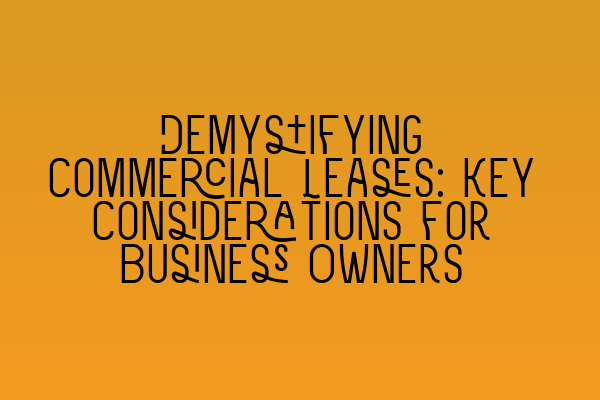Demystifying Commercial Leases: Key Considerations for Business Owners
As a business owner, one of the most important decisions you’ll make is finding the right location for your business. Whether you’re starting a new venture or expanding your current operations, signing a commercial lease is a significant commitment that can impact the success of your business.
Understanding the key considerations involved in commercial leases is crucial to negotiate favorable terms and protect your interests. In this article, we’ll demystify commercial leases and provide you with essential information to help you make informed decisions.
1. Lease Term
The lease term refers to the length of time the lease agreement is valid. As a business owner, it’s important to consider how long you anticipate needing the space and whether it aligns with your business goals. Shorter leases offer flexibility but may come with higher rent, while longer leases provide stability but limit your ability to move or adapt to changing circumstances.
Related Article: SQE Preparation for Property Practice: Mapping Out Your Strategy
2. Rent and Additional Costs
The cost of rent is a significant factor when considering a commercial lease. Ensure that you fully understand the rent structure, including any rent escalations or adjustments over the lease term. In addition to the base rent, ask about additional costs such as utilities, maintenance, insurance, and taxes. These additional costs can significantly impact your overall expenses.
Related Article: Updates in UK Property Laws: Key Changes and Implications
3. Use of Space
Review the permitted use clause in the lease agreement carefully to ensure that it aligns with your business activities. Certain properties may have zoning restrictions or usage limitations that could impact your ability to operate your business as intended. Seek legal advice to clarify any ambiguities or potential restrictions to avoid any future legal challenges.
Related Article: Legal challenges in property transactions: A comprehensive guide
4. Repairs and Maintenance
Determine which party is responsible for repairs, maintenance, and any necessary improvements in the leased property. Ensure that the lease agreement clearly outlines these responsibilities and the process for addressing any maintenance issues that may arise. Knowing who is responsible for repairs can help you budget and avoid surprise expenses.
5. Assignment and Subletting
Consider the future growth or changes in your business and evaluate whether the lease allows for assignment or subletting. Flexibility in transferring or subletting your lease can provide opportunities to downsize, expand, or sell your business. However, be aware that lease assignments or sublets may require the landlord’s consent and may involve additional costs or restrictions.
6. Termination
Understand the terms and conditions for terminating the lease agreement. Review the notice period required for termination and any penalties or obligations that may apply. Circumstances may change, and having options for terminating the lease can provide flexibility and minimize your financial liabilities.
7. Negotiation and Legal Advice
Before signing a commercial lease, it’s important to negotiate and understand every aspect of the agreement. Seek legal advice from a property law solicitor who specializes in commercial leases. A solicitor can review the lease, explain the terms and conditions, identify any potential risks, and negotiate on your behalf to ensure your best interests are protected.
Related Article: Navigating Lease Laws in the UK: Essential Guidelines for Tenants and Landlords
Conclusion
Entering into a commercial lease is a significant decision for any business owner. By considering the key factors discussed in this article and seeking professional advice, you can navigate the process with confidence and secure a lease agreement that aligns with your business objectives.
If you have more questions or need assistance with commercial leases and property law, do not hesitate to reach out to SQE Property Law & Land Law. Our team of experienced solicitors is here to help you.
Related Article: Dominate Property Law Questions: Avoiding Common Pitfalls
